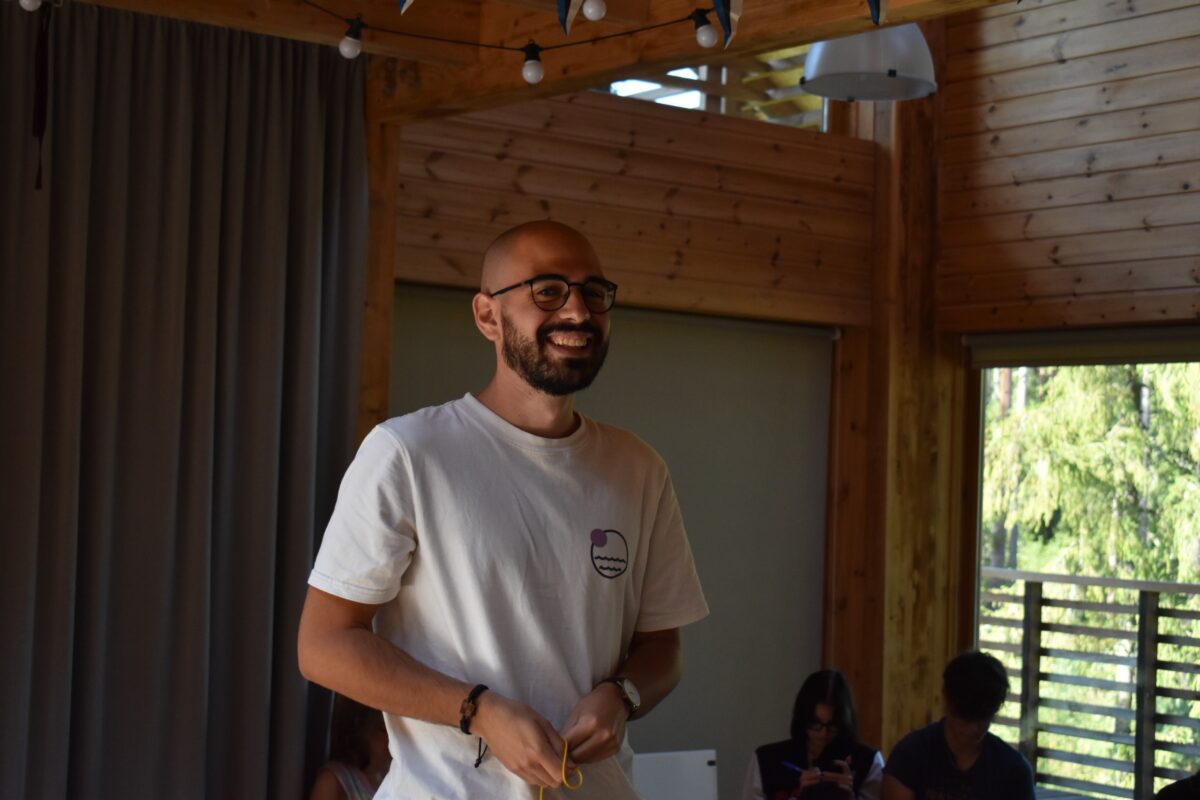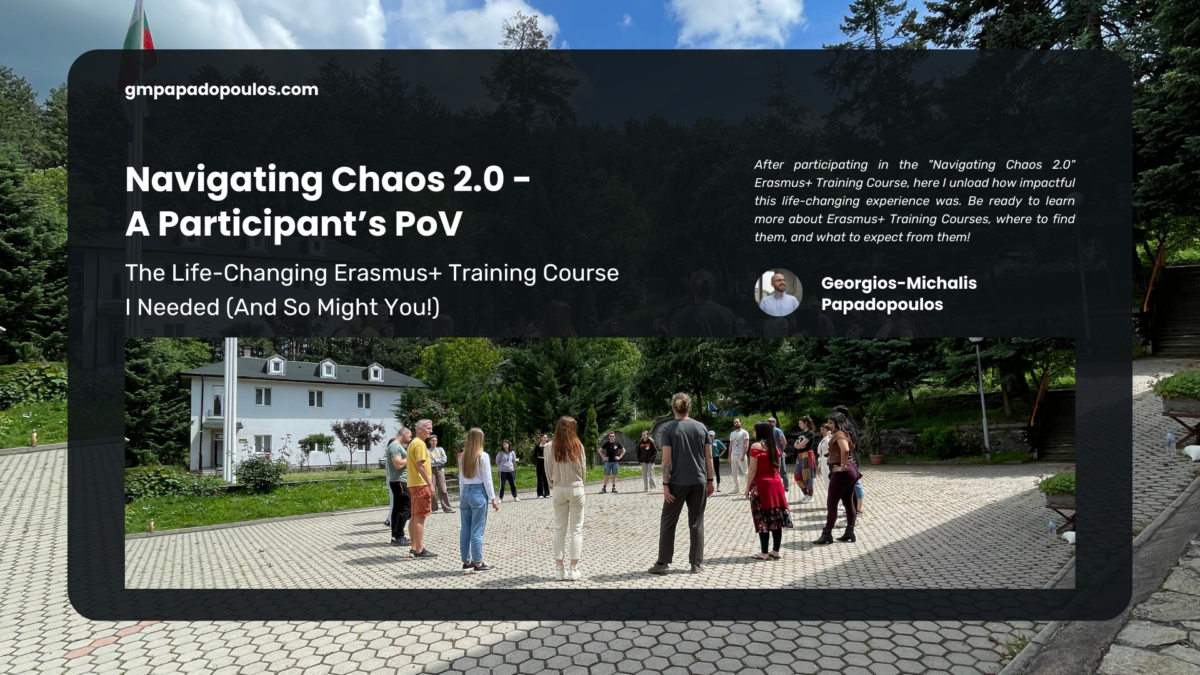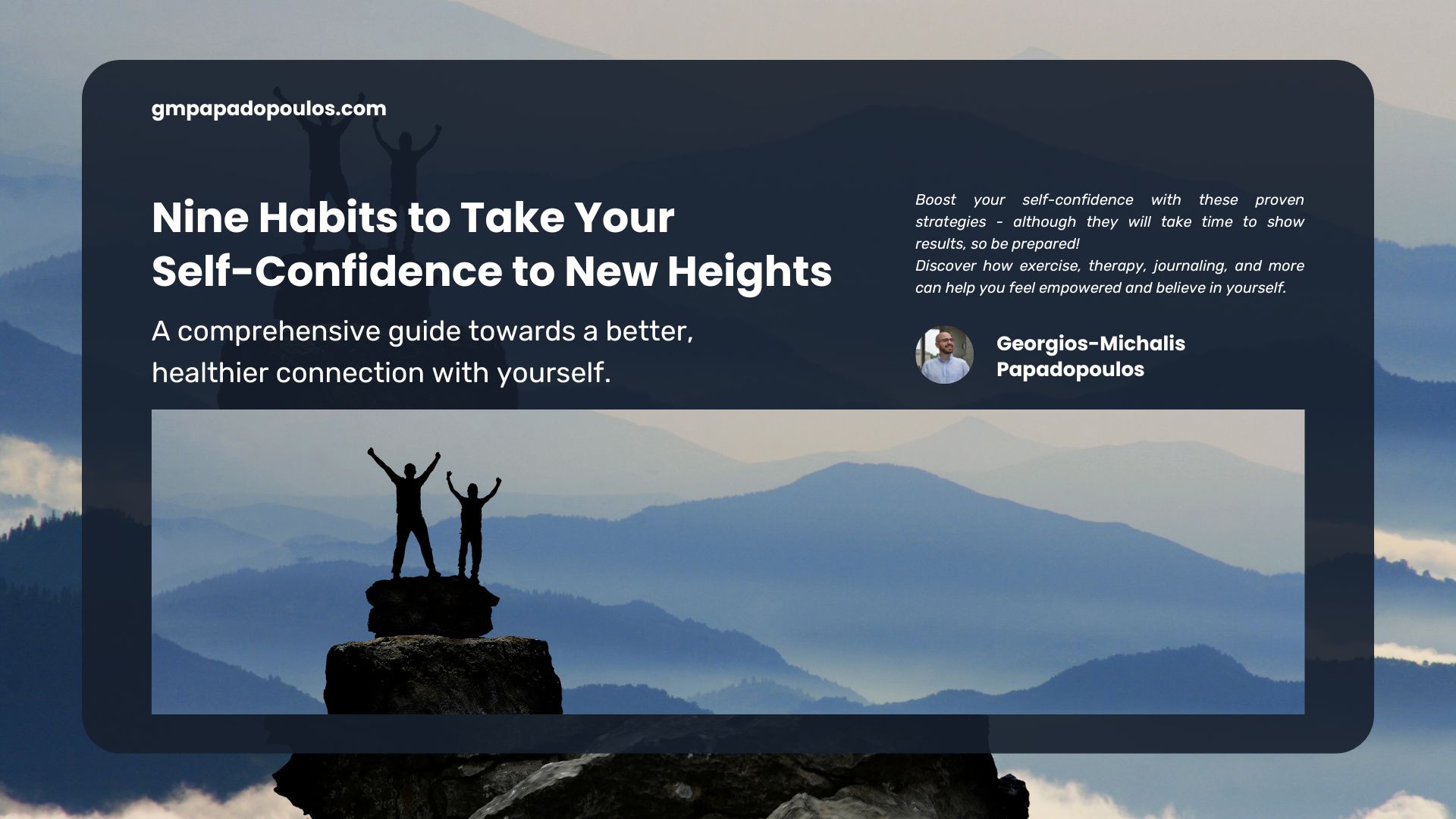Hello and best wishes for your Fall! This article is for you, if:
- Improving your self-confidence and your overall well-being is a top priority for you.
- You wish to learn better habits to implement in your daily life.
- You enjoy a storytelling approach, combined with puns, anecdotal but also scientific evidence, and lots of useful insights.
At this stage, it’s impossible to draft a blog post that isn’t personal to me. This one is no exception.
There’s a reason I am passionate enough to research, self-apply, and write about such a topic. There’s always a reason.
Truth is, I and confidence were not the best buddies. And I am certainly not alone; Psychology Today reported that around 85% of people worldwide struggle with low self-esteem. 85%!
It’s a reality most of us face. We tend to be our harshest critics when we should have been our biggest fans.
So, I’ve started learning more about the subject because of how personal it became to me recently.
I even had the chance to spread the knowledge I have been learning this August by designing, facilitating, and leading a workshop on the subject!
It happened in the “Lead-Off” Erasmus+ Youth Exchange Course in Estonia, organized by Monada MTU, in Taevaskoja, Estonia. Two weeks have passed, yet I cherish the experience and the people I met there.

Based on these 8 days, my personal story, all the courses and materials I have been learning from in 2024, and the upcoming personal strengths workshop I will be facilitating in Thessaloniki on Wednesday the 11th, I decided to make a comprehensive guide on self-confidence.
In hopes that it will inspire you to make a first (or second, or third) step towards a better, healthier relationship with yourself.
And to repeat them to myself. I need to hear them as much as you do.
As always, I’ll initiate with my story. Let’s go!
Table of Contents
My personal story through self-confidence
The truth is that my confidence level one year before graduating high school was low. Extremely low.
At 16 years old, I played League of Legends all day. My grades were the lowest in my class. My friends were few and not well-matching.
My parents even came to me to let me know that times were tough, and since I was putting in zero effort, they wouldn’t pay for tuition for extra classes. For non-Greeks, due to our underfunded education, you face tough chances of achieving adequate grades in the national university entry exams without tutoring. It’s a death sentence to any university aspirations
I remember begging them to give me a chance, and they did. Something that I am grateful for.
Having my back against the wall, this was the first time I took something seriously – and the start of building my self-esteem from seemingly nothing.
From that point onwards, I thought I went a long way in that journey.
On and on, I challenged myself to achieve something extra. To believe that I can do it.
I graduated, got my first job, was constantly advancing professionally, survived the school of boredom called the Greek Army, was looking out for my chronic and disabling health issues, volunteered, and traveled.
And, in December of 2023, I felt I was at my highest. Freshly arrived in Warsaw, with a high-paying job, and a loving, beautiful partner by my side.
Life was good. I was finally confident & happy. Yet… was I?
The first signs of what was to come emerged, and it became clear that something was wrong.
They made me recognize that I was building my confidence in milestones, overcoming challenges, and surpassing myself. Much of my project was laid down on quicksand.
I didn’t have self-confidence; I had external confidence. And this type can always come and go.
Even though I was already attempting to change, the perfect storm hit, far before I could protect anything not built on solid ground. A storm that led me to leave Poland, break up with my partner, and face an uncertain future. You can read that full story – plus what to expect from expat life – by clicking here!
And that’s how I am here; standing up to rebuild myself; yet, this time, better than ever before.
True self-confidence arises in times of adversity, not calm
Also taking inspiration from my “Is this the right problem to solve” blog post, sometimes we aren’t truly focusing on what matters.
In the case of our self-esteem, this is normal. When things are rolling relatively smoothly, you have no reason to question yourself thoroughly.
Yet, visualize this; the sea. A dark, bottomless beautiful ocean. And you, sailing through with your lovely, trusted boat.
As long as the water keeps you afloat, you keep floating.
Nothing’s here to test you. The winds are calm; the terrifying ocean floor is hidden beneath; no creatures desire to topple you. No problems ahead for you to solve.
But life’s far from constant smooth sailing; suddenly, clouds form, winds rocking you around. Sharks pop out of the water – yes, they even appear in the sky and become airborne, because that’s plausible enough for AI to generate. The sea gets shallow, and rocks appear on your horizon to sink you.

That’s the biggest lesson I received in 2024. It sounds (better, reads) obvious, but it can be easy to forget.
And, again; if you are here reading these lines and empathizing, don’t feel bad. Just look around you & you’ll see that many of us are on the same turbulent boat in one way or another.
- Young people’s happiness, at least in many parts of the developed world, is shrinking (The Guardian).
- In an April survey from the Thriving Center of Psych, 2/5 of millennials are experiencing a life crisis in 2024 alone.
- According to Pew Research, meaning-of-life is often based on external validators, such as friends, family, or career; when things rapidly change, this can leave people questioning.
Crises are bound to happen. And when they strike, we have the opportunity to comprehend the most about ourselves.
And how we judge our internal ability to navigate such waters – believing we can bring the ship, sooner or later, to the calmer seas of serenity once more – is where true self-confidence emerges.
How can you know if your self-confidence can be improved?
Say you are experiencing this rocky voyage nowadays, doubting you can even make it in one piece ahead.
Or, even if you don’t face such adversities at the moment, you suspect, even are aware, that your self-confidence is low.
Here are some basic indicators:
- You are a people pleaser, facing difficulties setting boundaries and saying no.
- You don’t trust your abilities and usually stick to your comfort zone.
- You don’t accept compliments and describe yourself critically and negatively – internally or to others.
- You constantly catch yourself comparing yourself to others.
- Or, you might even be a perfectionist and can’t accept criticism – because false, fragile confidence is also an indicator of low self-esteem
Does any of these sound familiar?
If so, I do hope you stick around.
But please note the following:
Knowing is NOT half the battle.
The G.I Joe fallacy is real, people.
But in short, you should always remember that: Just because you know something’s wrong doesn’t mean you’ll act upon it.
The point of this article is to build habits for self-confidence.
No amount of information will change you, no matter how motivational, uplifting, and sugarcoating it can be.
Sadly, the only way is to act upon such information, not just consume it.
Through achievable & consistent daily steps.
Which brings me to the second caveat:
Habits take TIME to be enforced (and bring results)
General belief believes that habits are built over the span of three weeks.
Yet, this is far from the truth. It’s merely an outdated rule of thumb.
So many factors can come into play, altering your timeframes; some people can do it in 3 weeks or less, yet others may need 3-6 months (Health.com).
It’s up to who you are, your situation & circumstances.
One thing is certain for all; consistency is key.
Similarly to so many aspects of life, results take time and effort.
- If you wish to see yourself in your ideal physique, you need to exercise often and take care of your diet, over many, many months.
- Rome was not built in a day, but by consistently beating (and copying, and improving) Greeks, Carthage, Elephants, Goths, and whatever came in front of their way.
- And to nurture and maintain the romantic (or even platonic) relationship you’ve always wished for – if you ever find the right person who is also willing to put in the work, of course – you have to be prepared for an uphill battle; being there for them in good and bad times, recognizing your flaws, and putting in the work to improve.
Everyone who says otherwise is, well, either very naive, holds unrealistic expectations, or wants to sell you stuff.
And with that, I may kick off with the habits; starting with the fundamental No.0:
Habit No.0 (The One Habit to Rule Them All) – Journaling
Everybody spent the first half of 2024 talking about AI. You probably heard of that.
But, do you know that AI would never work if it didn’t have one key resource?
The answer is data. Copious, astonishing amounts of data. The more the merrier.
Now, do I suggest you start building this data through journaling, feed them into an algorithm, and pinpoint behavioral trends to start fixing them?
No. No, that’s crazy! Or… is it?
Ok ok, no.
Yet, journaling and a journ-ey (haha… bad puns) toward better well-being go hand in hand.

I started journaling due to my migraines, but I quickly expanded the practice for self-help and improvement.
Plenty of benefits, but here are just some indicative ones:
- Our memories SUCK. We forget our achievements when we need them to feel proud, and we idealize broken situations when they are gone; try building good self-confidence with these mechanisms in place. But guess what won’t happen if you keep track of things, safely stored on paper, so you can retrieve them whenever needed.
- You can, indeed, explore patterns. In this case; you can note down times when you doubted yourself, with the reason why; then, try to use the information to see what creates the problem, and tackle it.
- You can express your feelings and emotions, and begin to understand better & connect with yourself.
- It can help you set and keep track of your goals and achievements, but also your pitfalls – which is vital for Habit No2 and No3.
- You can monitor the language you tend to use on yourself – and that’s important for Habit No4!
It’s in my plan – yes, I promise I’ll write it soon – on how to keep a proper journal, my favorite structure, and what else to include. But for now, feel free to explore the subject online if you are interested.
Let’s move on to the next habits.
Habit No.1 – Play on your Strengths
There is no perfect person. Each of us has flaws and imperfections.
But we also have strengths!
We, of course, tend to focus on our flaws, imperfections, and insecurities.
Don’t beat yourself up for it, if you do; remember, 85% of us are in this self-doubting bracket, one way or another!
How about we switch our frame? How can we focus on what we offer?
Understanding our strengths and acting on them can be the dawn of our self-confidence since these can be the ones that make us happier by radiating our unique, beautiful energy!
There is a free test you can do from VIA Character, that’s very accurate and well recommended from numerous courses I’ve taken on Coursera, such as the recommended and used as a major source throughout this blog post “Science of Well Being”.
Before you do so though, may I suggest you self-reflect on it? Try to see which ones you believe. Then, compare the results and evaluate!
Once you have the list in mind, you can brainstorm ideas on using these strengths in your professional or personal lives.
What to do with those ideas? Moving on to:
Habit No.2 – Start Acting on Your Goals & Build on the Momentum
As previously mentioned, knowing is NOT half of the battle.
Once you find ideas on how to take advantage of your unique strengths, start putting them into action. And act on them!
Consider taking up Seligman et al. (2005)’s challenge of using one of your top 5 strengths every day for a week straight, in a different way each time, to receive the proven long-lasting benefits this will have in your happiness.
Generally speaking, setting up a plan for yourself and following suit with it should be a continuous process. And it’s also a topic for another blog post since I won’t be able to do it justice.
Here’s what I need to say for now; A coach’s work can do wonders with this point.
Because a professional in the field will ask the right questions, help you dig deeper, and enable you to draft a plan that works for you.
And if that sounds like a service you totally resonate with; I am a certified coach working with people who wish to better navigate change in their lives, you know? So let’s catch up!
Ok, enough self-promotion; Habit No3 is:
Habit No.3 – Mind your Language (Young Woman/Man!)
We watched this TEDx Talk in the Youth Exchange I mentioned above, and… oh man, it was so revealing for me.
The language we use, the way we frame things, h̶e̶l̶p̶s̶ ̶u̶s̶ ̶s̶e̶e̶ ̶t̶h̶e̶ ̶w̶o̶r̶l̶d̶.
No no, no! Delete that; let’s change it to hold us down to a specific, narrow perspective!
I struggled with negative self-talk all my life, and I still do. As someone who claims to be a good writer, it became infuriating for me that it took so, so long to get that.
- When I spoke about my achievements to others, I watered them down.
- Internally, I caught beating myself up with words each and every day, yet I did nothing about it.
- Even when I was a university student – something that I have actually worked on and now is much less present – I compared myself with others all the time.
Negative self-talk can be one prime cause of our plummeting self-confidence; once again, we tend to be our worst critics!
That’s why constant journaling helps to put so many of these things into perspective.
But there are also other things to consider here.
Activity: Write your Life Story
Allow me to suggest an exercise here that you might find useful.
Go and write, in one or two pages, your life story. Precisely as your brain dictates you to do.
Filter nothing; just do it.
For the following 2-3 days, go back at it once per day, and start switching the narrative. Some questions to ask:
- Were there any points you were too self-critical? Or even critical of others?
- Were there any good points/achievements you missed, but wish to add?
- Which are the support characters? What power do they have over you?
And, on the final 2-3 days; take the story, and rewrite it in the third person. Get out of your bubble and try to see it rationally.
You will be surprised how many insights you will gain from the process. And you can even do this for a longer period, constantly editing it according to the plan; making your newly written story a habit that your brain will follow.
That’s all for your internal communication. Moving on to something more external, to No.4:
Habit No.4 – Stay Social & Receive Support When Needed
We are social creatures.
And remaining social throughout our lives contributes to our overall well-being.
This isn’t just a commonly misconceived rule of thumb, though. Research has shown, again and again, how strong social ties make you happier (Diener & Seligman, 2002).
Maintaining these connections and striving to share experiences with others (something that has been proven by Boothby et al. (2014)’s research, even with strangers), can boost our overall well-being and self-confidence – knowing that we belong somewhere.
And yes, this counts for introverts too.
So get out there, and nurture the right relations with others. Even try to get out of your comfort zone and speak with strangers.
And, in hardship, lean on your connections – of course, without overwhelming them. Good friends have good things to say to you when you most need them.
Don’t forget to reciprocate, as they might need them too. Do support yourself, but extend your kindness to others too, eh?
And if you’re asking “how to give back”, take some notes from Habit No.5!
Habit No.5 – Express Gratitude

Finally, it’s time to learn how to appreciate stuff in your life.
The ones that we so easily take for granted, and in the pursuit of more, tend to forget that they exist; relationships, a roof over our heads, our tiny or grander achievements.
Each day – and even more than once, if possible – invest time in appreciating your wins, your givens in life, and the acts of kindness others have bestowed you with. Or, anything else that is meaningful to you.
You can start by three points daily, then get it up to five. There’s no upper limit though – if one day gives you more reasons to be grateful, take the extra lines or time to appreciate them too!
This is about the mindset perspective, and that’s why it’s about building gratitude as a habit.
To automatically be aware that, even in tougher times, there are lots of things that keep you going. That it is never as terrible as it seems.
How to do it, it’s up to you. But if you keep a journal, these two can be combined. I told you that it’s the one habit to rule them on!
Or you can do it during Habit No.6:
Habit No.6 – Meditate (Please, Don’t Roll Your Eyes and Listen) Towards Mindfulness
Ok, this one might be the hardest one to swallow for many.
You may stand there, reading these lines, and be like “Ffs, not this bullcrap again”.
And if you are one of those people, Let Me Google That For You!
Meditation is a tool for improved Mindfulness.
Yes, Mindfulness, not Meditation, is the destination here.
Do you ski? Ok, that’s the most random question ever, never mind.
Even if you don’t, you must be aware of the snowball effect.
Tapping into your internal dialogue, catching up on bad thoughts before they materialize into monstrous ones, is what you strive for.
To be more present, and be able to gain better mental balance within you.
For internal, complete balance, though; you need one extra element – the one discussed in No.7:
Habit No.7 – Exercise and Keep Your Body Healthy & Energized
The last one concerns the body.
Physical activity can improve mood, reduce stress, and boost self-esteem.
And it’s the one point I always had issues with.
But what I heard from the facilitator in our Erasmus+ Youth Exchange in Estonia, Vojtech, resonated with me.
As a coach, he found that many of his mind-driven clients faced issues with their well-being, as they were not focusing on connecting with their bodies too.
It is also very well connected with my learnings from my recent Erasmus+ Training Course in Bulgaria, where we paid lots of attention to embodiment and internal balance.

Anyways, the Greeks said it first; νους υγιής εν σώματι υγιεί (a healthy mind in a healthy body).
This has been my prime motivation to start dancing classes this September – something I considered that will never happen with me.
As for the benefits? They won’t come overnight. But I’ll return to this point in a few months, and let you know!
But that’s almost all my time, 3000+ words in. Let me wrap this up with this:
Habit No.00 (The One Important Topic You Should Never Forget) – Seek the Professional Help of a Therapist
I wish to complete this post with a vital note.
Many of our issues do happen because of our past.
And dwelling there is difficult without the proper, professional support.
I come from Greece; a country that has only recently been getting comfortable with therapy. And it took us 15+ years of constant economic and social crisis to do so!
There is no shame to contact a therapist and start healing, to increase your self-confidence, mental well-being, or for any other reason. And there is no better time to do so than… yesterday.
Do not wait until the troubles hit you; as the sea can turn violent at any minute.
Get the help you deserve, before you need it. Get a therapist to go through your past. And get a coach (contact me, wink wink) to strategize your future.
Both are useful and are an investment, toward the one person that should matter most in your life.
You (queen/king).
Take care, and see you soon!

Comments are closed.